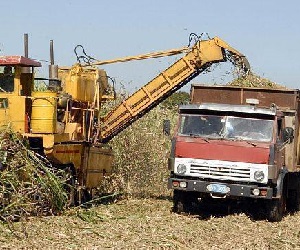 Despite the lack of material resources, solutions must be encouraged from the productive base, exhorted Jorge Luis Tapia Fonseca, Cuban deputy prime minister, when verifying the progress of the repairs in the sugar mills during meetings with managers from the province of Villa Clara committed to the realization of an agro-industrial efficiency harvest.
Despite the lack of material resources, solutions must be encouraged from the productive base, exhorted Jorge Luis Tapia Fonseca, Cuban deputy prime minister, when verifying the progress of the repairs in the sugar mills during meetings with managers from the province of Villa Clara committed to the realization of an agro-industrial efficiency harvest.
The sector has to “work like a family, without distortions and inaccuracies, and with a different perspective on direct links between producers and service entities,” Tapia Fonseca said, when appreciating, based on information, aspects related to the mechanical hustle and bustle towards the interior of the mills, the agricultural machinery, and the automotive and rail transport that will intervene in the contest.
The deputy prime minister, accompanied by Julio Andrés García, president of the Azcuba Group, and by specialists from the sector, learned about the actions carried out in Heriberto Duquesne (Remedios), Quintín Bandera (Corralillo) and Héctor Rodríguez (Sagua la Grande), the only ones in the province that will manufacture crude oil.
In October it is estimated that the mechanical adjustments will be completed to guarantee the readiness of the industries in a discrete harvest in terms of processing volumes, but necessary for the national economy, he said.
The criteria coincided in pointing out that, despite the start-up of other plants that will process cane destined for molasses for the production of alcohol and animal feed, the strategic gear that will be established by other entities in the industry, suppliers of raw material and provision of services, is decisive. , with the three mills in campaign.
The electrical affectations that stop the mechanical adjustments, the limitations of industrial gases and accessories for welding, the adaptations of roads and railways, figured in the subjects object of analysis.
The planting of cane, agricultural yields —still far from the aspirations—, the feeding of the labor groups in sugar operations and the salary according to the productive contributions, were the object of systematic observation.
The Heriberto Duquesne plant, an entity that is moving towards a complete agro-industrial diversification, will be supplied with its own raw material and from areas belonging to its counterpart José María Pérez (Camajuaní), with which it will guarantee molasses and guarapo to the distillery, as well as crude and bagasse directed to the Chiquitico Fabregat refinery (Zulueta), in a systematic production chain.
On Saturday, in Quintín Bandera, Tapia Fonseca specified the need to “unblock the bureaucracy that exists in the sector to deliver material resources, depending on the existence, availability and needs of Villa Clara’s factories,” and directed quality repairs for mills above the 70% of the potential norm.
There they will have a reinforcement of workers from Panchito Gómez Toro, from Quemado de Güines —now in technological investment actions—, in addition to raw material and cane cutting and shooting equipment from that industry; as well as the Ifraín Alfonso (Ranchuelo) and the neighboring George Washington and Carlos Baliño (Santo Domingo), necessary to produce some 23,000 tons of raw sugar and another 28,000 of refined sugar.
In Héctor Rodríguez, with better strategic clearance in the actions to be carried out by that sugar colossus, Tapia Fonseca reiterated the need for labor groups to achieve “creative thinking, and convert agro-industrial preparations and the harvest into an effective way of seeking answers to problems that arise.”
That mill, together with the raw material from its plantations, will receive cane from areas belonging to Perucho Figueredo and Abel Santamaría (Encrucijada), entities in charge, like the others, of support in cutting and shooting equipment for collection centers and the tilter .
Vigilance in the payment for the quality of the cane, the eradication of monetary debts with the producers, and the discipline and control of agro-industrial tasks were also included in the extensive analysis, and given the economic complexities -said Tapia Fonseca-, the challenge is to carry out a harvest efficiently.
(With information from the Vanguardia newspaper)